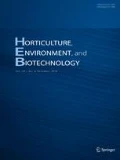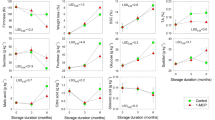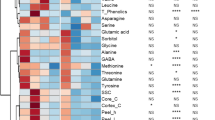Abstract
After harvest, ‘Sangjudungsi’ persimmon (Diospyros kaki Thunb.) fruit quickly soften and develop physiological disorders during cold storage. The objective of this study was to evaluate the effectiveness of 1-methylcyclopropene (1-MCP) and aminoethoxyvinylglycine (AVG) treatments on fruit quality attributes and antioxidant metabolites in ‘Sangjudungsi’ persimmon fruit stored at 0.5 °C and 95% relative humidity over a 3-month period. The treatments caused a reduction in weight loss; in the middle of the cold storage, the soluble solids content was higher with the AVG treatment than with the 1-MCP treatment. Both treatments reduced the incidence and severity of peel blackening and fruit softening, whereas fruit decay was only affected by AVG. The content of total phenolic compounds was lower with AVG than with 1-MCP or in the untreated control during the same period. At the end of cold storage, the AVG treatment resulted in a greater total flavonoid and total antioxidant activity and a higher reduced glutathione level than with 1-MCP or in the untreated control. AVG likely evoked the least physiological and biochemical responses in persimmons, according to the results of a normalized heatmap matrix system. Correlation coefficient networking results showed that 1-MCP and AVG caused differential correlation responses between the fruit quality variables and targeted metabolites during cold storage. Overall, the results indicated that treatment of cold-stored persimmons with 1-MCP and AVG likely reduced the incidence of physiological disorders, although antioxidant metabolites were relatively less affected by both regulators.








Similar content being viewed by others
References
Adams DO, Yang SF (1979) Ethylene biosynthesis: identification of 1-aminocyclopropane-1-carboxylic acid as an intermediate in the conversion of methionine to ethylene. Proc Natl Acad Sci USA 76:170–174. https://doi.org/10.1073/pnas.76.1.170
Ahn GH, Choi S-J, Shin GH, Kim JT (2018) Quality assessment of ‘Fuyu’ persimmon treated by a combination of γ-irradiation and 1-methylcyclopropene. Kor J Food Preserv 25:411–416. https://doi.org/10.11002/kjfp.2018.25.4.411
Apel K, Hirt H (2004) Reactive oxygen species: metabolism, oxidative stress, and signal transduction. Annu Rev Plant Physiol Plant Mol Biol 55:373–399. https://doi.org/10.1146/annurev.arplant.55.031903.141701
Basu S, Duren W, Evans CR, Burant CF, Michailidis G, Karnovsky A (2017) Sparse network modeling and metscape-based visualization methods for the analysis of large-scale metabolomics data. Bioinformatics 33:1545–1553. https://doi.org/10.1093/bioinformatics/btx012
Besada C, Novillo P, Navarro P, Salvador A (2014) Effect of a low oxygen atmosphere combined with 1-MCP pretreatment on preserving the quality of ‘Rojo Brillante’ and ‘Triumph’ persimmon during cold storage. Sci Hortic 179:51–58. https://doi.org/10.1016/j.scienta.2014.09.015
Brand-Williams W, Cuvelier ME, Berset C (1995) Use of a free radical method to evaluate antioxidant activity. LWT - Food Sci Technol 28:25–30. https://doi.org/10.1016/S0023-6438(95)80008-5
Byeon S-E, Lee J (2020) Fruit quality and major primary metabolites differ across production systems in cold-stored figs (Ficus carica L.). Sci Hortic 274:109669. https://doi.org/10.1016/j.scienta.2020.109669
Byeon S-E, Lee J (2020) Differential responses of fruit quality and major targeted metabolites in three different cultivars of cold-stored figs (Ficus carica L.). Sci Hortic 260:108877. https://doi.org/10.1016/j.scienta.2019.109160
Byers RE (1997) Peach and nectarine fruit softening following aminoethoxyvinylglycine sprays and dips. HortScience 32:86–88. https://doi.org/10.21273/HORTSCI.32.1.86
Cascia G, Bulley SM, Punter M, Bowen J, Rassam M, Schotsmans WC, Larrigaudière C, Johnston JW (2013) Investigation of ascorbate metabolism during inducement of storage disorders in pear. Physiol Plant 147:121–134. https://doi.org/10.1111/j.1399-3054.2012.01641.x
Child RD, Williams AA, Hoad GV, Baines CR (1984) The effects of aminoethyoxyvinylglycine on maturity and post-harvest changes in Cox’s Orange Pippin apples. J Sci Food Agric 35:773–781. https://doi.org/10.1002/jsfa.2740350714
Choi S-J (2015) Sunlight causes skin blackening in ‘Fuyu’ persimmon fruits during storage. Kor J Hortic Sci Technol 33:55–60. https://doi.org/10.7235/hort.2015.14076
Choi J-H, Lee U-Y, Ahn Y-J, Hwang Y-S, Chun J-P (2013) Effects of ethephon and aminoethoxyvinylglycine on fruit quality and incidence of physiological disorders during simulated exportation environment in ‘Wonhwang’ pears. Kor J Agric Sci 40:79–86. https://doi.org/10.7744/cnujas.2013.40.2.079
Choi S-T, Ahn G-H, Kim E-S, Kang S-M, Kang S-K (2015) Not harvesting ‘Fuyu’ persimmons after frost damage in autumn has no negative effects on tree storage reserves and growth in the subsequent season. Sci Hortic 190:94–97. https://doi.org/10.1016/j.scienta.2015.04.011
Choi J-Y, Lee H-J, Cho J-S, Lee Y-M, Jin L, Woo J-H, Moon K-D (2016) Effect of freezing temperature on quality characteristics of dried persimmons. Kor J Food Preserv 23:931–938. https://doi.org/10.11002/kjfp.2016.23.7.931
Chong J, Soufan O, Li C, Caraus I, Li S, Bourque G, Wishart DS, Xia J (2018) MetaboAnalyst 4.0: towards more transparent and integrative metabolomics analysis. Nucl Acids Res 46:W486–W494. https://doi.org/10.1093/nar/gky310
Chongchatuporn U, Ketsa S, van Doorn WG (2013) Chilling injury in mango (Mangifera indica) fruit peel: relationship with ascorbic acid concentrations and antioxidant enzyme activities. Postharvest Biol Technol 86:409–417. https://doi.org/10.1016/j.postharvbio.2013.07.023
Chung SW, Yu DJ, Lee HJ (2016) Changes in anthocyanidin and anthocyanin pigments in highbush blueberry (Vaccinium corymbosum cv. Bluecrop) fruits during ripening. Hortic Environ Biotechnol 57:424–430. https://doi.org/10.1007/s13580-016-0107-8
Davey MW, Keulemans J (2004) Determining the potential to breed for enhanced antioxidant status in Malus: mean inter- and intravarietal fruit vitamin C and glutathione contents at harvest and their evolution during storage. J Agric Food Chem 52:8031–8038. https://doi.org/10.1021/jf048531k
Fawbush F, Nock JF, Watkins CB (2009) Antioxidant contents and activity of 1-methylcyclopropene (1-MCP)-treated ‘Empire’ apples in air and controlled atmosphere storage. Postharvest Biol Technol 52:30–37. https://doi.org/10.1016/j.postharvbio.2008.08.014
Franck C, Baetens M, Lammertyn J, Scheerlinck N, Davey MW, Nicolaï BM (2003) Ascorbic acid mapping to study core breakdown development in ‘Conference’ pears. Postharvest Biol Technol 30:133–142. https://doi.org/10.1016/S0925-5214(03)00108-X
Giusti MM, Wrolstad RE (2001) Characterization and measurement of anthocyanins by UV-visible spectroscopy. In: Wrolstad RE, Acree TE, Decker EA, Penner MH, Reid DS, Schwartz SJ, Shoemaker CF, Smith DM, Sporns P (eds) Current protocols in food analytical chemistry. Wiley, Hoboken, pp 1–13
Halder-Doll H, Bangerth F (1987) Inhibition of autocatalytic C2H4-biosynthesis by AVG applications and consequences on the physiological behaviour and quality of apple fruits in cool storage. Sci Hortic 33:87–96. https://doi.org/10.1016/0304-4238(87)90035-5
Hodges DM, Lester GE, Munro KD, Toivonen PMA (2004) Oxidative stress: importance for postharvest quality. HortScience 39:924–929. https://doi.org/10.21273/HORTSCI.39.5.924
Hume HH (1914) A kaki classification: Japanese persimmon probably a conglomerate species—only satisfactory method of arranging its varieties seems to be on basis of behavior when pollinated—influence of seed on fruit. J Hered 5:400–406. https://doi.org/10.1093/oxfordjournals.jhered.a107909
Jia Z, Tang M, Wu J (1999) The determination of flavonoid contents in mulberry and their scavenging effects on superoxide radicals. Food Chem 64:555–559. https://doi.org/10.1016/S0308-8146(98)00102-2
Kamiyoshihara Y, Tieman DM, Huber DJ, Klee HJ (2012) Ligand-induced alterations in the phosphorylation state of ethylene receptors in tomato fruit. Plant Physiol 160:488–497. https://doi.org/10.1104/pp.112.202820
Kang I-K, Byun J-K, Kweon H-J, Kim M-J, Kwon S-I, Park M-Y, Lee DH, Choi C (2007) Effects of aminoethoxyvinylglycine on preharvest drop, fruit color, and quality of ‘Tsugaru’ apples. Hortic Environ Biotechnol 48:159–164
Kasai S, Arakawa O (2010) Antioxidant levels in watercore tissue in ‘Fuji’ apples during storage. Postharvest Biol Technol 55:103–107. https://doi.org/10.1016/j.postharvbio.2009.08.008
Lafuente MT, Zacarias L, Martinez-Tellez MA, Sanchez-Ballesta MT, Dupille E (2001) Phenylalanine ammonia-lyase as related to ethylene in the development of chilling symptoms during cold storage of citrus fruits. J Agric Food Chem 49:6020–6025. https://doi.org/10.1021/jf010790b
Larrigaudière C, Lentheric I, Pintó E, Vendrell M (2001) Short-term effects of air and controlled atmosphere storage on antioxidant metabolism in conference pears. J Plant Physiol 158:1015–1022. https://doi.org/10.1078/0176-1617-00114
Lee EJ (2014) Major metabolites involved in skin blackening of ‘Niitaka’ pear stored under cold temperature. Hortic Sci Technol 32:359–365. https://doi.org/10.7235/hort.2014.13191
Lee EJ (2014) Chilling injury and phytochemical composition of peach fruits as affected by high carbon dioxide treatment before cold storage. Hortic Environ Biotechnol 55:190–195. https://doi.org/10.1007/s13580-014-0187-2
Lee J, Cheng L, Rudell DR, Watkins CB (2012) Antioxidant metabolism of 1-methylcyclopropene (1-MCP) treated ‘Empire’ apples during controlled atmosphere storage. Postharvest Biol Technol 65:79–91. https://doi.org/10.1016/j.postharvbio.2011.11.003
Lee J, Cheng L, Rudell DR, Nock JF, Watkins CB (2019) Antioxidant metabolism in stem and calyx end tissues in relation to flesh browning development during storage of 1-methylcyclopropene treated ‘Empire’ apples. Postharvest Biol Technol 149:66–73. https://doi.org/10.1016/j.postharvbio.2018.11.015
Leisso RS, Buchanan DA, Lee J, Mattheis JP, Sater C, Hanrahan I, Watkins CB, Gapper N, Johnston JW, Schaffer RJ, Hertog MLATM, Nicolaï BM, Rudell DR (2015) Chilling-related cell damage of apple (Malus × domestica Borkh.) fruit cortical tissue impacts antioxidant, lipid and phenolic metabolism. Physiol Plant 153:204–220. https://doi.org/10.1111/ppl.12244
Lemmens E, Alós E, Rymenants M, De Storme N, Keulemans W (2020) Dynamics of ascorbic acid content in apple (Malus x domestica) during fruit development and storage. Plant Physiol Biochem 151:47–59. https://doi.org/10.1016/j.plaphy.2020.03.006
Lichtenthaler HK (1987) Chlorophylls and carotenoids: Pigments of photosynthetic biomembranes. In: Lester Packer RD (ed) Methods in enzymology. Academic Press, London, pp 350–382
Lo’ay AA, El-Khateeb AY (2018) Antioxidant enzyme activities and exogenous ascorbic acid treatment of ‘Williams’ banana during long-term cold storage stress. Sci Hortic 234:210–219. https://doi.org/10.1016/j.scienta.2018.02.038
Lwin HP, Lee J (2020) Fruit quality and major metabolites in cold-stored ‘Wonhwang’ Asian pears are differentially affected by fruit size. J Sci Food Agric 100:5117–5125. https://doi.org/10.1002/jsfa.10422
Lwin HP, Choi J-H, Chun J-P, Watkins CB, Lee J (2021) 1-Methylcyclopropene treatment alters fruit quality attributes and targeted metabolites in ‘Wonhwang’ pears during shelf life. Sci Hortic 284:110125. https://doi.org/10.1016/j.scienta.2021.110125
Mir NA, Perez R, Schwallier P, Beaudry R (1999) Relationship between ethylene response manipulation and volatile production in Jonagold variety apples. J Agric Food Chem 47:2653–2659. https://doi.org/10.1021/jf981150k
Mittler R (2002) Oxidative stress, antioxidants and stress tolerance. Trends Plant Sci 7:405–410. https://doi.org/10.1016/S1360-1385(02)02312-9
Nam H-C, Lee HJ, Hong S-J, Kim S-J, Kim T-C (1998) Varietal differences in fruit characteristics of sweet and astringent persimmons (Diospyros kaki Thunb.). J Kor Soc Hortic Sci 39:707–712
Noctor G, Foyer CH (1998) Ascorbate and glutathione: Keeping active oxygen under control. Annu Rev Plant Physiol Plant Mol Biol 49:249–279. https://doi.org/10.1146/annurev.arplant.49.1.249
Ozturk B, Uzun S, Karakaya O (2019) Combined effects of aminoethoxyvinylglycine and MAP on the fruit quality of kiwifruit during cold storage and shelf life. Sci Hortic 251:209–214. https://doi.org/10.1016/j.scienta.2019.03.034
Parfitt DE, Yonemori K, Honsho C, Nozaka M, Kanzaki S, Sato A, Yamada M (2015) Relationships among Asian persimmon cultivars, astringent and non-astringent types. Tree Genet Genomes 11:1–9. https://doi.org/10.1007/s11295-015-0848-z
Park SJ, Hong SS, Lee CS (2000) Softening of astringent persimmon (Diospyros Kaki Thunb.) as affected by harvest time, temperature, and ethephon treatment. Kor J Hortic Sci Technol 18:395–398
Park DS, Tilahun S, Heo JY, Park KC, Jeong CS (2017) Effect of 1-MCP on persimmon fruit quality and expression of ethylene response genes during ripening. J Amer Pom Soc 71:103–111
Park DS, Tilahun S, Heo JY, Jeong CS (2017) Quality and expression of ethylene response genes of ‘Daebong’ persimmon fruit during ripening at different temperatures. Postharvest Biol Technol 133:57–63. https://doi.org/10.1016/j.postharvbio.2017.06.011
Salvador A, Cuquerella J, Martinez-Javega JM, Monterde A, Navarro P (2004) 1-MCP preserves the firmness of stored persimmon ‘Rojo Brillante.’ J Food Sci 69:S69–S73. https://doi.org/10.1111/j.1365-2621.2004.tb15516.x
Salvador A, Arnal L, Monterde A, Cuquerella J (2004) Reduction of chilling injury symptoms in persimmon fruit cv. ‘Rojo Brillante’ by 1-MCP. Postharvest Biol Technol 33:285–291. https://doi.org/10.1016/j.postharvbio.2004.03.005
Salvador A, Arnal L, Carot JM, Carvalho CP, Jabaloyes JM (2006) Influence of different factors on firmness and color evolution during the storage of persimmon cv. ‘Rojo Brillante.’ J Food Sci 71:S169–S175. https://doi.org/10.1111/j.1365-2621.2006.tb08921.x
Seo H-J, Wang Y-S, Lwin HP, Choi J-H, Chun J-P, Roan S-F, Chen I-Z, Lee J (2019) Early season ‘Wonhwang’ pear fruit quality following international transport and storage is negatively impacted by fruitlet stage gibberellic acid4+7 (GA4+7) application but improved by postharvest 1-methylcyclopropene (1-MCP). Sci Hortic 256:108549. https://doi.org/10.1016/j.scienta.2019.108549
Shahkoomahally S, Ramezanian A, Farahnaky A (2015) Postharvest nitric oxide treatment of persimmon (Diospyros kaki L.) improves fruit quality during storage. Fruits 70:63–68. https://doi.org/10.1051/fruits/2014045
Singleton VL, Orthofer R, Lamuela-Raventos RM (1999) Analysis of total phenols and other oxidation substrates and antioxidants by means of Folin-Ciocalteu reagent. Methods Enzymol 299:152–178. https://doi.org/10.1016/S0076-6879(99)99017-1
Sisler EC, Dupille E, Serek M (1996) Effect of 1-methylcyclopropene and methylenecyclopropane on ethylene binding and ethylene action on cut carnations. Plant Growth Regul 18:79–86. https://doi.org/10.1007/BF00028491
Stevens R, Page D, Gouble B, Garchery C, Zamir D, Causse M (2008) Tomato fruit ascorbic acid content is linked with monodehydroascorbate reductase activity and tolerance to chilling stress. Plant Cell Environ 31:1086–1096. https://doi.org/10.1111/j.1365-3040.2008.01824.x
Strano MC, Timpanaro N, Allegra M, Foti P, Pangallo S, Romeo FV (2021) Effect of ozonated water combined with sodium bicarbonate on microbial load and shelf life of cold stored clementine (Citrus clementina Hort. ex Tan.). Sci Hortic 276:109775. https://doi.org/10.1016/j.scienta.2020.109775
Tao D, Wang J, Zhang L, Jiang Y, Lv M (2019) 1-Methylcyclopropene alleviates peel browning of ‘Nanguo’ pears by regulating energy, antioxidant and lipid metabolisms after long term refrigeration. Sci Hortic 247:254–263. https://doi.org/10.1016/j.scienta.2018.12.025
Tilahun S, Seo MH, Park DS, Jeong CS (2018) Effect of cultivar and growing medium on the fruit quality attributes and antioxidant properties of tomato (Solanum lycopersicum L.). Hortic Environ Biotechnol 59:215–223. https://doi.org/10.1007/s13580-018-0026-y
Toivonen PMA (2004) Postharvest storage procedures and oxidative stress. HortScience 39:938–942. https://doi.org/10.21273/HORTSCI.39.5.938
Torres CA, Hernandez O, Moya-León MA, Razmilic I, Rudell DR (2016) Antioxidant metabolism and gene expression during “stain” development on ‘Fuji’ apples during cold storage. HortScience 51:1031–1037. https://doi.org/10.21273/HORTSCI.51.8.1031
Wang L, Chen S, Kong W, Li S, Archbold DD (2006) Salicylic acid pretreatment alleviates chilling injury and affects the antioxidant system and heat shock proteins of peaches during cold storage. Postharvest Biol Technol 41:244–251. https://doi.org/10.1016/j.postharvbio.2006.04.010
Wang Y, Xie X, Song J (2016) Preharvest aminoethoxyvinylglycine spray efficacy in improving storability of ‘Bartlett’ pears is affected by application rate, timing, and fruit harvest maturity. Postharvest Biol Technol 119:69–76. https://doi.org/10.1016/j.postharvbio.2016.04.023
Watkins CB, Nock JF, Whitaker BD (2000) Responses of early, mid and late season apple cultivars to postharvest application of 1-methylcyclopropene (1-MCP) under air and controlled atmosphere storage conditions. Postharvest Biol Technol 19:17–32. https://doi.org/10.1016/S0925-5214(00)00070-3
Win NM, Yoo J, Ryu S, Lee J, Jung H-Y, Choung M-G, Park K-i, Cho Y-J, Kang S-J, Kang I-K (2017) Effects of harvest times with polyethylene (PE) film liner, 1-methylcyclopropene (1-MCP) and aminoethoxyvinylglycine (AVG) treatments on fruit quality in ‘Sangjudungsi’ persimmon during cold storage. Kor J Food Preserv 24:898–907. https://doi.org/10.11002/kjfp.2017.24.7.898
Win NM, Lee J, Yoo J, Ryu S, Kim K-O, Kim DH, Jung H-Y, Choung M-G, Park K-I, Cho Y-J, Kang I-K (2018) Effects of polyethylene film liner, 1-methylcyclopropene, and aminoethoxyvinylglycine treatments on fruit quality attributes of ‘Tonewase’ persimmon fruits during cold storage. Hortic Sci Technol 36:256–265. https://doi.org/10.12972/kjhst.20180026
Win NM, Yoo J, Lee J, Jung H-Y, Kang I-K (2019) Effect of different CO2 deastringency application timing on fruit quality attributes and physiological disorders in cold-stored ‘Sangjudungsi’ persimmon fruit. Hortic Sci Technol 37:395–403. https://doi.org/10.7235/HORT.20190040
Wright KP, Kader AA (1997) Effect of slicing and controlled-atmosphere storage on the ascorbate content and quality of strawberries and persimmons. Postharvest Biol Technol 10:39–48. https://doi.org/10.1016/S0925-5214(96)00061-0
Yonemori K, Siugiura A, Yamada M (2010) Persimmon genetics and breeding. Plant Breed Rev 19:191–225. https://doi.org/10.1002/9780470650172.ch6
Yoo J, Kang I-K, Park J-Y, Kim K-O, Win NM, Ryu S, Kim DH, Choung M-G, Lee J (2016) Effect of storage temperature and fruit quality attributes and storage disorders in cold-stored ‘Sangjudungsi’ persimmon fruit. Prot Hortic Plant Fac 25:262–269. https://doi.org/10.12791/KSBEC.12016.12725.12794.12262
Yoo J, Kang I-K, Ryu S, Win NM, Lee J (2019) Effect of application timing of deastringency and 1-methylcyclopropene treatments on fruit quality attributes and physiological disorders of two astringent persimmon cultivars during cold storage. Hortic Sci Technol 37:384–394. https://doi.org/10.7235/HORT.20190039
Yu YB, Yang SF (1979) Auxin-induced ethylene production and its inhibition by aminoethyoxyvinylglycine and cobalt ion. Plant Physiol 64:1074–1077. https://doi.org/10.1104/pp.64.6.1074
Zhang Z, Zhang Y, Huber DJ, Rao J, Sun Y, Li S (2010) Changes in prooxidant and antioxidant enzymes and reduction of chilling injury symptoms during low-temperature storage of ‘Fuyu’ persimmon treated with 1-methylcyclopropene. HortScience 45:1713–1718. https://doi.org/10.21273/HORTSCI.45.11.1713
Zhang J, Lu J, Mantri N, Jiang L, Ying S, Chen S, Feng X, Cao Y, Chen Z, Ren L, Lu H (2018) An effective combination storage technology to prolong storability, preserve high nutrients and antioxidant ability of astringent persimmon. Sci Hortic 241:304–312. https://doi.org/10.1016/j.scienta.2018.07.017
Acknowledgements
Financial support for this research was supplied by a Grant from 2017 Research Fund [Grant Number PJ01164001] of the Rural Development Administration, Republic of Korea.
Author information
Authors and Affiliations
Contributions
NMW: Data curation, Formal analysis, Investigation, Methodology, Writing, Revision. JY: Data curation, Formal analysis, Investigation, Methodology, Writing, Revision. HPL: Data curation, Investigation, Methodology, Writing, Revision. EJL: Investigation, Methodology, Discussion, Writing, Revision. I-KK: Conceptualisation, Investigation, Methodology, Discussion, Writing, Revision. JL: Conceptualisation, Data curation, Investigation, Writing, Reviewing & Editing.
Corresponding author
Ethics declarations
Conflict of interest
The authors have declare that they no conflict of interest.
Additional information
Communicated by Yong-Bum Kwack, Ph.D.
Publisher's Note
Springer Nature remains neutral with regard to jurisdictional claims in published maps and institutional affiliations.
Rights and permissions
About this article
Cite this article
Win, N.M., Yoo, J., Lwin, H.P. et al. Effects of 1-methylcyclopropene and aminoethoxyvinylglycine treatments on fruit quality and antioxidant metabolites in cold-stored ‘Sangjudungsi’ persimmons. Hortic. Environ. Biotechnol. 62, 891–905 (2021). https://doi.org/10.1007/s13580-021-00360-z
Received:
Revised:
Accepted:
Published:
Issue Date:
DOI: https://doi.org/10.1007/s13580-021-00360-z




